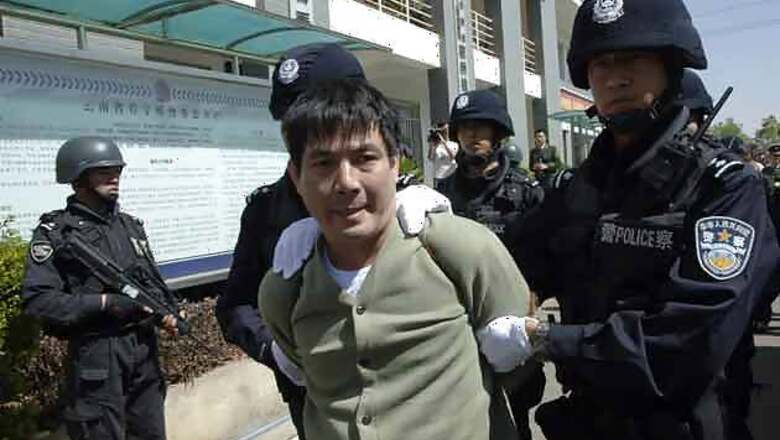
views
Beijing: Burmese drug lord Naw Kham and three of his accomplices were executed on Friday in China after they were convicted of murdering 13 Chinese sailors in Thailand. The gang allegedly colluded with Thai soldiers in an attack on two Chinese cargo ships in 2011.
Kham and the others were paraded on live state-run television in China before their execution that evoked strong criticism from the public. Kham, a Myanmarese drug mafia boss, and his accomplices, identified as Hsang Kham, (Thailand) Yi Lai, (stateless) and Zha Xika (Laos), were paraded before cameras before their execution by lethal injection in the city of Kunming in southwest China's Yunnan Province, according to the Intermediate People's Court of Kunming.
Many social media users have reacted angrily, condemning the broadcast as insensitive. It is believed to be the first time in China's recent history that live footage of condemned criminals being taken to the place of execution has been broadcast.
It seems that the Chinese government wants to send out a clear signal to the general public that they are taking very tough action against foreign criminals, a BBC commentary said. While some have applauded the move to parade the Mekong killers, many Chinese internet users spoke out against the special programme, in what some are saying was a throw-back to the execution rallies of China's past.
Prosecutors of the Kunming People's Procuratorate were present to supervise the execution of the Mekong killers to ensure that the execution is conducted in accordance with the law. The accused were also given opportunities to meet their close relatives.
The executions took place after the Supreme Court rejected their appeals. The consulates of Thailand and Myanmar in Kunming were notified about their executions on February 24, state-run Xinhua news agency reported. The men were apprehended in a joint operations of police from China, Laos, Myanmar and Thailand.
The gang was found guilty of masterminding and colluding with Thai soldiers in an attack on two Chinese cargo ships on the Mekong River on October 5, 2011. The 100-strong gang was reported to have been involved in drug trafficking, kidnap and murder along the Mekong.
Since 2008, they launched 28 attacks against Chinese cargo ships on the river, killing 16 Chinese citizens and injuring three, according to the police. On the day of the crime, 13 Chinese sailors were murdered and their bodies thrown into the Mekong after the two Chinese cargo ships, the Hua Ping and Yu Xing 8, were hijacked.
The gang colluded with Thai soldiers to carry out the attack, police said. Narcotics were placed on the Chinese ships to make it look like a drug hit. China conducted their trial quoting international conventions stating that the crimes occurred on two Chinese registered ships flying the Chinese flag the trial could be held on Chinese territory.
Naw Kham was arrested by police in Laos on April 25 and handed over to the Chinese police in May. He had denied the charges or any involvement in the murder of the sailors. But testimony from other gang members sealed his fate, Yin Ling, a prosecutor at Yunnan Provincial People's Procuratorate said.
Naw Kham offered compensation of 6 million yuan ($964,000) to the families of the victims. The four men were sentenced to death on November 6 after being convicted of intentional homicide, kidnapping, transporting drugs and hijacking cargo ships.
Two other gang members were also sentenced with two-year suspended death sentences and eight-year prison terms. Naw Kham betrayed no emotion when informed of his fate, according to Yang Xiaoping, a member of the collegiate bench in the first hearing of the case at the Intermediate People's Court in Kunming, who delivered the result to him personally.
"He said he wanted to see his children. But he does not know their telephone numbers, and we are unable to contact them," she said. Naw Kham said he had 10 children. Lin Li, Naw Kham's lawyer, said she regretted the compensation offered by Naw Kham could not save his life.
Li Cangqi, the father of the cook Li Yan, one of the victims, said he was dissatisfied at the compensation offer. "The compensation is only 380,000 yuan. My daughter used to give us 1,000 yuan a month out of her 3,000 yuan salary. I and her mother feel like the sky is falling after hearing of her death," he said.
(With Additional Inputs From PTI)




















Comments
0 comment